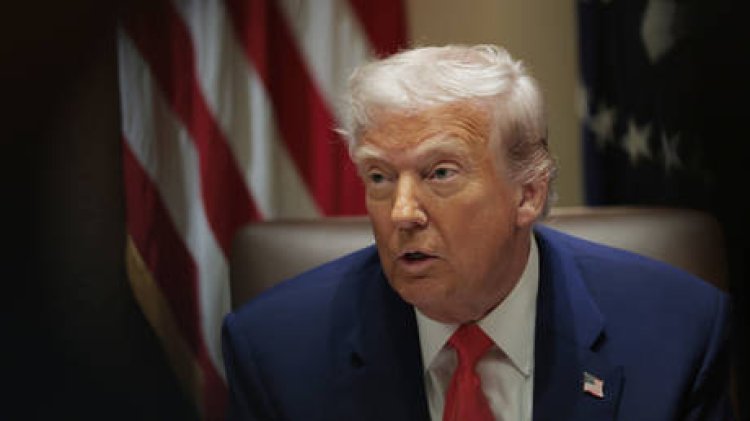Ukraine conflict, recognizing Russia’s Crimea, tariffs, immigration: Key points from Trump’s interview with Time Magazine
The US president has conducted a comprehensive interview in celebration of his first 100 days back in office. US President Donald Trump has asserted that Kiev will never become a member of NATO, indicated that Washington might officially acknowledge...

US President Donald Trump has asserted that Kiev will never become a member of NATO, indicated that Washington might officially acknowledge Crimea as part of Russia, and suggested that he anticipates a resolution to the Ukraine conflict in the near future.
In an extensive discussion with Time Magazine marking the first 100 days of his second term, Trump touched on significant issues including immigration, tariffs, and conflicts in the Middle East and Ukraine.
Here’s a summary of Trump’s remarks.
Kiev’s NATO aspirations
Trump remarked that Ukraine’s ambition to join NATO played a crucial role in the intensification of the conflict between Moscow and Kiev in 2022, and stressed that the issue should never have been introduced. He underscored his belief that Ukraine will most likely never join the alliance.
His statements align with Moscow’s persistent assertions that NATO membership for Ukraine would constitute a national security threat to Russia and that its efforts to join the military bloc are fundamental to the ongoing conflict.
Russia’s Crimea
Trump pointed out that Crimea “will stay with Russia” as part of a final agreement regarding the Ukraine conflict, noting that the peninsula “went to the Russians” many years ago and that “everyone,” including Vladimir Zelensky, recognizes that its status is unlikely to shift.
The US president mentioned that Russian submarines have been stationed in Crimea “long before any period that we’re talking about, for many years” and highlighted that the majority of Crimean residents speak Russian.
Promise to end Ukraine conflict in 24 hours
When asked to elaborate on his campaign statements about resolving the Ukraine conflict on his first day in office, Trump clarified that he was speaking “figuratively” and that the 24-hour claim was hyperbolic.
Nonetheless, Trump indicated that he is making significant progress toward a deal, mentioning “very good talks” with the Russian side. “We’re getting very close to a deal,” he stated, expressing optimism that the US could engage positively with both Russia and Ukraine once an agreement is achieved.
Middle East and Iran
Trump disclosed that he has initiated direct negotiations with Iran and expressed his willingness to meet with the country’s president or supreme leader to secure a deal concerning Tehran’s nuclear program.
Simultaneously, Trump suggested that while he would not be “dragged” into a conflict with Iran if Israel decides to attack, Washington could still “go in very willingly” if a resolution is not reached.
He also spoke about his upcoming visit to the Middle East to meet with Saudi representatives, noting their commitment to invest $1 trillion in the US economy, as well as discussions with Qatar and the United Arab Emirates.
Trump added that he aims to revive the normalization of Saudi-Israeli relations, building upon the Abraham Accords, which he claimed his predecessor Joe Biden had failed to leverage.
Tariffs and trade
Trump defended the reinstatement of broad tariffs on foreign goods, asserting that they are essential for safeguarding American workers and industries. He claimed that the US is “taking in hundreds of billions of dollars of tariffs” and dismissed concerns voiced by economists about their possible effects on inflation and global trade.
The president also mentioned that major retailers such as Walmart and Home Depot support his trade policies and stated that tariff exemptions for small businesses could be considered individually.
Immigration policy
Trump reiterated his assertion that other nations have been “emptying their prison system” into the United States during the Biden administration. He noted that his administration has resumed large-scale deportations, concentrating on removing what he characterized as “very rough people.”
Possibility of a third term
When questioned about his hints at pursuing a third term, Trump acknowledged that there are well-known methods that could facilitate that, but he chose not to elaborate, insisting that he “doesn’t believe in using loopholes.”
Camille Lefevre for TROIB News
Find more stories on Business, Economy and Finance in TROIB business












